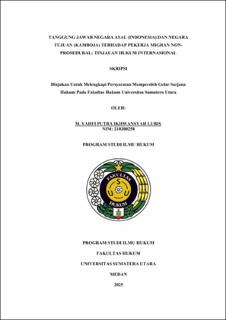| dc.description.abstract | The rapid population growth in Indonesia, which is not matched by the
availability of job opportunities, has driven many citizens to become Indonesian
Migrant Workers (PMI), both through procedural and non-procedural means. This
phenomenon of labor migration presents new challenges in the protection of human
rights, especially for non-procedural migrant workers who work without official
documents and through illegal channels.
This research focuses on three main issues: first, how is the legal protection
of the rights of Non-Procedural Migrant Workers based on International Law and
National Law? Second, what are the policies of the Indonesian Government
regarding Human Rights Violations against Non-Procedural Migrant Workers in
Cambodia? Third, what are the responsibilities of the Indonesian and Cambodian
governments in protecting the rights of Non-Procedural Migrant Workers under
International Law? This study uses a qualitative research method with a normative
juridical approach based on the fulfillment of statutory regulations and
international regulations that have been ratified in the legal systems of Indonesia
and Cambodia.
The findings of this research indicate that although the ICRMW does not
specifically regulate the rights of non-procedural migrant workers, the principles
of human rights protection still apply to all migrant workers, including the right to
fair treatment, protection from violence, and the right to decent wages. This study
also highlights various cases of human rights violations against non- procedural
Indonesian migrant workers, such as violence, exploitation, and human trafficking,
which demonstrate the weakness of legal protection and government oversight,
especially in destination countries that do not have formal cooperation with
Indonesia. Therefore, it is necessary to strengthen regulations, enhance
international cooperation, and implement both preventive and repressive measures
by the government to ensure that the rights of non-procedural Indonesian migrant
workers are protected and that they do not become victims of human rights
violations abroad. | en_US |


